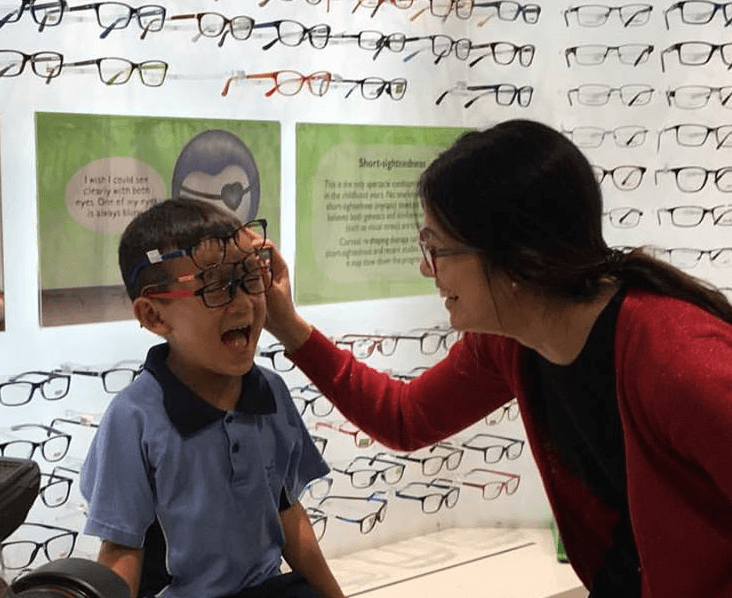Plastic frames have always sounded safer and sturdier than metal frames for children, and most parents think about this when they choose their kid’s glasses. But can small children wear metal frames? Of course they can! As more and more reputable brands like Flexon and Nike create metal frames designed for small children, there is no reason children need to adhere to a small range of specific frames.
Let’s compare plastic v metal frames and weigh out the pros and cons:
Plastic
Design
Plastic is easy to mould during the manufacturing process and comes in more shapes and sizes. Thicker frames mean more canvas for loud prints or bold designs.
Colour
A wide range of colours allows your child to make bolder fashion statements. Children love the bright colours that come with plastic frames.
Weight
This is dependent on the type of material a frame is made from as these days super light weight plastic is available.
Durability/ Impact Resistance
A lot of good quality plastic frames are much sturdier than metal frames and are resistant to permanent deformation when dropped or upon impact, but they may snap when placed under high stress. If your child plays sports, you can get polycarbonate lenses as these lenses are very strong.
Allergies
Plastic does not contain nickel, so there are no allergies. Most plastic frames are hypoallergenic.
Lens Thickness
Plastic frames can support stronger lens prescriptions because frames are thicker. The frames also conceal the thickness of the lens edges.
Utility or Functionality
Flexible plastic is better for a baby. When your preschooler grows to be an active child who loves sports, polycarbonate sports glasses are the best choice.
Fit
Many plastic frames fit the face of a child nicely, but for kids with low nose bridges (which is common, as kids’ nasal bones are usually still underdeveloped), the weight of plastic frames can make the spectacles slip down their noses. Plastic frames lose their adjustments a bit faster, so you need to get your child’s glasses tightened or adjusted more frequently.
Availability
A wide range of plastic frames of various colours and designs are available for you to choose from.
Comfort
Plastic frames have a set nose bridge, so they will either be very comfortable for some people and not comfortable for others. Frames can be a heavier acetate or a lighter plastic frame.
Metal
Design
Serious minimalist look makes your preschooler look more mature. Some kids love it when they have spectacles that resemble people they relate to like Harry Potter.
Colour
Limited range of colours such as gold, silver, black. Colours also don’t stand out as much due to the minimalist approach.
Weight
Metal frames are designed to be thinner, so they have a lighter overall frame.
Durability/ Impact Resistance
The advantage of metal frames over plastic frames is if sat on in some cases metal can be bent back into place. However, certain metal frames like titanium Flexon metal is a great choice as they are light but very durable, having a 2 year warranty.
Allergies
Some metal frames have nickel alloys in them which causes nickel allergy. However, Flexon, titanium, and stainless steel frames are hypoallergenic, meaning they will not react to your skin.
Lens Thickness
Metal frames have a thinner eyewire so when lenses are thicker they are more noticeable.
Utility or Functionality
A child who requires an exact bifocal line needs the unlimited adjustability and hence will benefit from a metal frame with adjustable nose pads.
Fit
Metal holds shape better, so metal frames can be adjusted to fit the face much easier. Cable temples (temples that curl behind the ears for better fit) are also available mostly with metal frames. Metal frames have adjustable nose pads to lift the frames higher, allowing your child to focus on the correct part of the lens at all times.
Availability
Metal frames generally have more limited options compared to plastic frames.
Comfort
Metal frames have adjustable nose pads so they can be made to sit well on any nose. Nose pads also allow the frame to sit of the face so it’s a good option for people who work in hot or cold conditions.
How about rimless glasses?
Our optical dispenser Greg Sexty says, ‘Rimless glasses are great for people who want super light glasses and who like the invisible look as they blend in to the face due to them not having a metal or plastic rim, however they need more delicate care than a full rim frame so when purchasing a rimless frame be aware of this. Keeping this in mind, I would not normally recommend full rimless spectacles for children’.
So, plastic or metal?
Plastic and metal frames, like all things, have their pros and cons, generally, though plastic frames offer more colour choices and are easier to wear (comfort), so children often choose plastic frames. Always aim for the best fit and comfort when you select your child’s glasses because their vision quality and quality of learning will depend largely on this.

Also take into consideration the aesthetics as small children can be self-conscious especially at school with other children.
Our practices offer a broad selection of children’s frames for your preschooler. Our skillful optical dispensers are highly trained and experienced to fit preschoolers their spectacles. Plastic or metal—our optical dispensers will help you choose the best frame for your child.
Greg added, ‘We love to see kids walk out of our store with a smile on their faces’.
